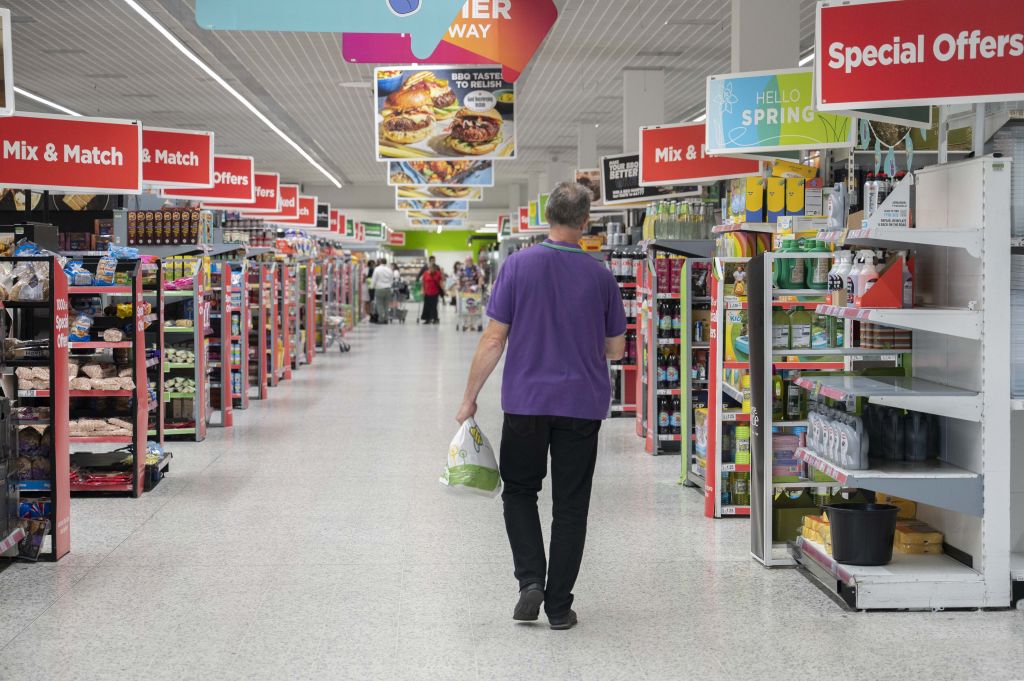Retailer price inflation falls to near-2 year low, new figures show
A fall in supermarket inflation led the way, with fresh food price hikes dropping significantly since January.


Get the latest financial news, insights and expert analysis from our award-winning MoneyWeek team, to help you understand what really matters when it comes to your finances.
You are now subscribed
Your newsletter sign-up was successful
Want to add more newsletters?

Twice daily
MoneyWeek
Get the latest financial news, insights and expert analysis from our award-winning MoneyWeek team, to help you understand what really matters when it comes to your finances.

Four times a week
Look After My Bills
Sign up to our free money-saving newsletter, filled with the latest news and expert advice to help you find the best tips and deals for managing your bills. Start saving today!
Inflation in retailers has fallen to its lowest rate in almost two years with food prices driving the drop, new figures from the British Retail Consortium (BRC) have shown.
The trade body for UK stores, including supermarkets, found price hikes slowed to a rate of 2.5% in February - down from 2.9% a month before. Much of this fall came as a result of a 1.1 percentage point deceleration in food inflation to 5%.
Easing energy and fertiliser costs in the food supply chain helped to bring the rate of supermarket price hikes down. However, it still remains above the rate of the Consumer Prices Index (CPI) - the UK’s official measure of inflation - which is sitting at 4%.
MoneyWeek
Subscribe to MoneyWeek today and get your first six magazine issues absolutely FREE

Sign up to Money Morning
Don't miss the latest investment and personal finances news, market analysis, plus money-saving tips with our free twice-daily newsletter
Don't miss the latest investment and personal finances news, market analysis, plus money-saving tips with our free twice-daily newsletter
Within the food figures, inflation for ambient goods (such as tinned ingredients, rice and pasta) remained significantly higher than headline inflation at 7.2%. But the rate had reduced from 7.7% in January. Fresh food price rises fell month-on-month from 4.9% to 3.4% - the lowest level recorded since February 2022. Meat, fish and fruit led the decrease.
Non-food inflation remained at 1.3%, 0.7 percentage points below the category’s three-month average of 2%. Although inflation went up across the furniture, electricals and health and beauty categories, promotional activity in clothing kept the rate at January’s level. The BRC took its figures from the week of 1 to 7 February.
Reflecting on the figures, Mike Watkins, the head of retailer and business insight at Nielsen IQ - the data analytics firm the BRC compiles its research with, said: "Shop price inflation has slowed and the underlying trend in prices will be downwards over the next few months.
“Since the start of the year, food retailers in particular have reduced prices as well as passing on price cuts coming through supply chains. For high street retailers faced with weaker demand, keeping prices stable over the next few months will be key to encourage customers to spend.”
The news comes as households are set to be hit by a series of significant hikes to utility bills in March and April. But there was good news last week as it emerged energy costs would fall for most households as a result of a big reduction in the Ofgem energy price cap.
‘Good news - but inflation pressures remain,’ BRC warns
Chief executive of the BRC, Helen Dickinson, said the findings should be seen as “good news” for consumers. However, she warned inflation could yet go up again as a result of international and UK-specific issues.
“Easing supply chain pressures have begun to feed through to food prices, but significant uncertainties remain as geopolitical tensions rise,” she said. “Prices of non-food goods will be more susceptible to shipping costs, which have risen due to the re-routing of imports around the Cape of Good Hope.
“Domestically, retailers face a major rise to their business rates bills in April, [which were] determined by last September’s sky-high inflation rate. April’s rates rise should be based on April’s inflation, and the Chancellor should use the Spring Budget to make this correction, supporting business investment and helping to drive down prices for consumers.”
Jeremy Hunt is set to deliver his Budget speech on 6 March. The Chancellor’s speech comes against the backdrop of a recession, which was confirmed earlier in February.
Get the latest financial news, insights and expert analysis from our award-winning MoneyWeek team, to help you understand what really matters when it comes to your finances.
-
 Can mining stocks deliver golden gains?
Can mining stocks deliver golden gains?With gold and silver prices having outperformed the stock markets last year, mining stocks can be an effective, if volatile, means of gaining exposure
-
 8 ways the ‘sandwich generation’ can protect wealth
8 ways the ‘sandwich generation’ can protect wealthPeople squeezed between caring for ageing parents and adult children or younger grandchildren – known as the ‘sandwich generation’ – are at risk of neglecting their own financial planning. Here’s how to protect yourself and your loved ones’ wealth.
